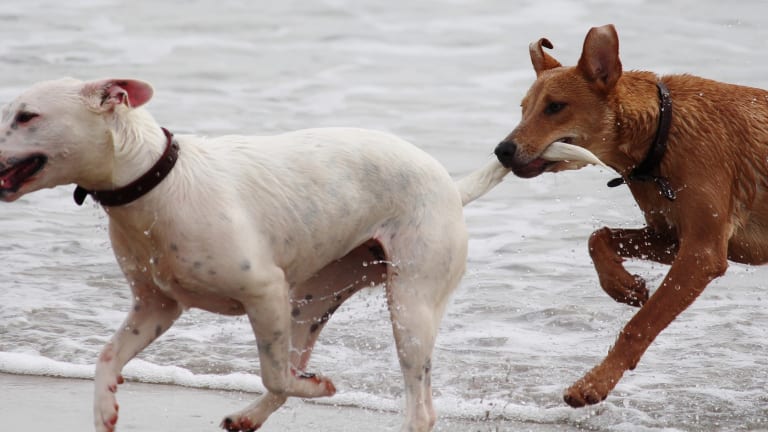
Dogs can also chase their tails as a compulsive behavior. Dogs that suffer from anxiety issues can bite their tails as a sign of distress it might be their way of dealing with their issues - definitely not a good solution.

Dogs can have a range of allergies from food allergies to environmental allergies.
What does it mean when a dog keeps chasing his tail. People believe that tail chasing is an autistic behavior therefore they make the connection that vaccinations cause tail chasing which is not true If your dog is obsessively chasing his tail. Your dog may lick or chew their tail if theyre feeling anxious. This is especially common when new guests visit or during thunderstorms.
Trauma to the tail or spine. Although its not always. Dogs can also chase their tails as a compulsive behavior.
In other words they can chase their tails due to an underlying mental illness that causes them to unnecessarily chew bite and chase their tail. Reasons For Dog Chasing Tail 1 Boredom Dogs most commonly chase their tails out of. If your dog is compulsively chasing his tail he can cause serious damage by biting and chewing on it when he finally does catch it.
Dogs have been known to experience hair loss on their tails due to this kind of behavior and even cause themselves injury. Dogs will also chase their tails when they are infested with parasites like intestinal parasites. It is a behavior that can help to move tapeworms and make them migrate out of the rectum.
Your pup can have microscopic parasites that you cannot see. Dogs may appear to be chasing their tail when theyre actually trying to reach and scratch their butt. Dogs sometimes need their anal glands expressed which can be done by a veterinarian or on.
When your dog is displaying compulsive and obsessive behavior such as biting or chewing on his tail it is generally an indication that there is someone else happening that is spurring their desire. My dog keeps crying and chasing his tail. I dont know what to do.
Bathed him with flea shampoo and still crying and miserable. I took him to an emergency clinic told. Up High Dog Tail Position When a dog approaches with his tail in the Up High Position observers may presume that he is confident powerful and secure.
In fact this position indicates a dominant pooch with an alpha streak. Alpha dogs are commanding take charge creatures who will assert their dominance when necessary. If a dog is wagging its tail and the rest of its body seems relaxed or is moving along with the wagging you are probably dealing with a happy comfortable dog.
Happy relaxed tail wagging is usually accompanied by a happy facial expression. A happy dog usually has bright eyes a relaxed open mouth and possibly a gentle pant. Because dog tail chewing results from various factors you have to become a bit of a detective to narrow down the possibilities.
Parasites are the most common reason for tail chewing but this behavior may also result from allergies impacted anal glands and just plain stress. Tail-chasing might also be caused by boredom or lack of exercise says Dr. Stephanie Liff DVM and Medical Director of Pure Paws Vet Care in New York City.
Dogs require a lot of stimulation and exercise to keep themselves in peak physical and mental condition. Dogs love chasing their own tail but some dogs have a tendency to chew and gnaw at the base of it. Sometimes theyll even do it to the point where it starts to bleed.
The lacerations could become infected and generally this is a behavior youll want to discourage. If chasing their tail calms their heart rate down your dog will correlate that with feeling better and this means that theyll start performing the same action time and again whenever they are feeling apprehensive. This means that a dog chasing their tail is not necessarily mentally ill but they may have their reasons for doing so.
Dogs can have a range of allergies from food allergies to environmental allergies. If your dog is biting its tail it may be because it is suffering from environmental or food allergies. Some of the most common environmental allergens include mold pollen or household chemicals.
Dogs that suffer from anxiety issues can bite their tails as a sign of distress it might be their way of dealing with their issues - definitely not a good solution. Also lack of exercise or playfulness will make your dog bored and unhappy which can lead to why your dog keeps biting his tail.